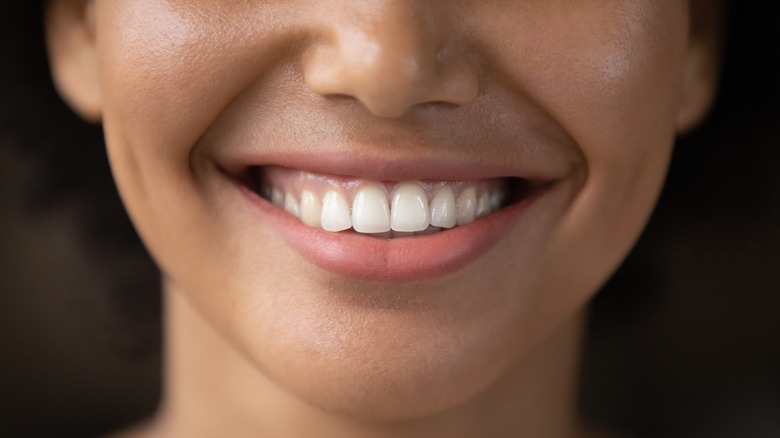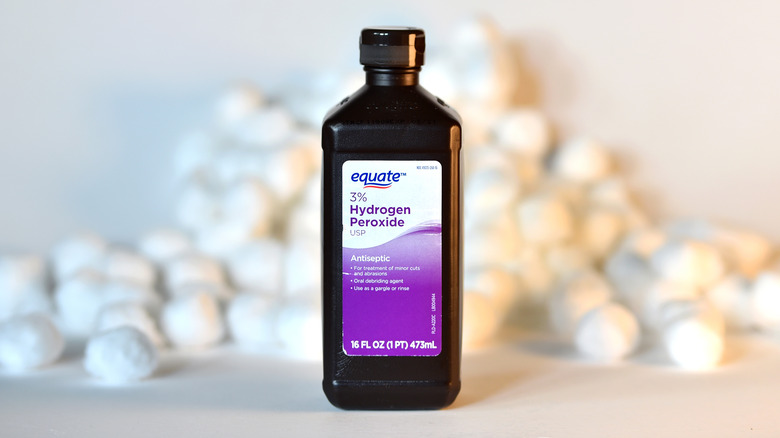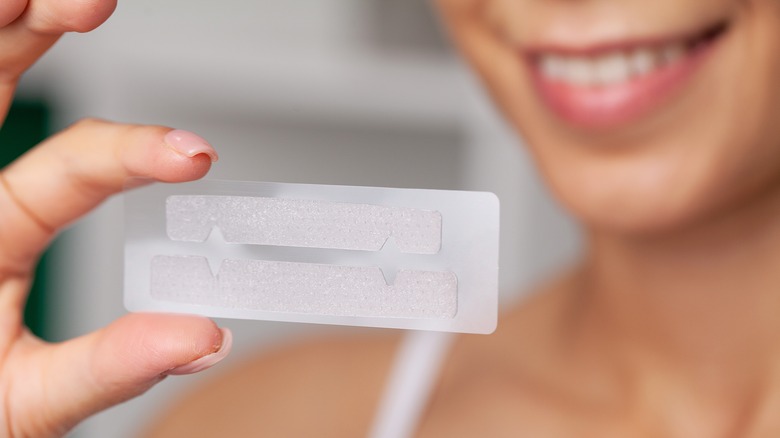Can You Use Hydrogen Peroxide To Whiten Your Teeth?
One of the first things someone might notice about you is your smile. Your smile can reveal features about your personality, including if you are closed-off, happy, introverted, or welcoming. Unfortunately, not everyone feels confident about their teeth, especially if they are yellow. Various circumstances, such as genetics and age, can cause yellow teeth. Smoking, certain foods, drinks, medications, and more can also make the teeth yellow. Whatever the case, having yellow teeth can deter you from smiling and, ultimately, ruin your self-esteem. However, there are ways to whiten your teeth, professionally and otherwise.
The Zoom treatment is one method to effectively whiten your teeth at the dentist's office. With Zoom, hydrogen peroxide gel is used and cured with a blue light laser to whiten teeth. Maya Allen wrote about Zoom for Byrdie and said about her experience, "My teeth were shades brighter than what they were before." Although using hydrogen peroxide in professional teeth whitening is nothing new, these treatments can cost hundreds of dollars. If this is out of your budget and you still want to improve your pearly whites, you can apply hydrogen peroxide at home to whiten your teeth using different methods.
The proper way to whiten your teeth with hydrogen peroxide
If you've ever had a cut or scrape, you're likely familiar with hydrogen peroxide. This household staple comes in a brown bottle that can be purchased at the drug or grocery store. Hydrogen peroxide acts as a disinfectant and cleans the skin to stave off infections. If used correctly, it can whiten teeth thanks to its chemical composition (H2O2). Dr. Sarah Pickering Beers explained to Cleveland Clinic, "The extra oxygen molecule oxidizes, which is how peroxide gets its power. This oxidation kills germs and bleaches color from porous surfaces like fabrics." Teeth, however, are also porous, and hydrogen peroxide can safely remove stains from them.
You can do this by either creating a hydrogen peroxide mouthwash or a paste. Whichever you decide to make, ensure that the hydrogen peroxide you choose has a concentration of 3% to 10%. For the mouthwash, the key is to dilute the hydrogen peroxide by mixing it with equal parts of water. You'll swish this concoction in your mouth for 30 seconds to one minute before spitting it out. As for the paste, use a few teaspoons of baking soda and a bit of hydrogen peroxide to form a thick mixture. Brush your teeth with it for a maximum of two minutes before spitting out the mix and rinsing your mouth.
The downside of hydrogen peroxide
Hydrogen peroxide has two main benefits — it's affordable, and it's not abrasive on the teeth. However, you don't have to do DIY teeth whitening. In fact, there are several whitening products on the market that already have hydrogen peroxide in them, including toothpaste, hydrogen peroxide-infused mouthwash, and whitening strips. Nevertheless, dentist Lilya Horowitz told Byrdie that some individuals should avert using hydrogen peroxide in their oral hygiene routine. She said, "If you have thin or worn down enamel, dental restorations that are failing or leaking, cavities, or inflamed gums, whitening is not recommended." In addition, there are side effects to be aware of.
Hydrogen peroxide can increase your teeth's sensitivity and irritate your gums. If this occurs or if you have concerns, see your dentist. There are also natural teeth whitening products that work. You could pull coconut oil in your mouth or use a baking soda paste made with water.Whitening strips made with coconut oil and other natural ingredients are also an alternative to hydrogen peroxide whitening strips. Experts note that professional whitening is the way to go if you want a thorough whitening with quick results. But regardless of what whitening method you choose, you'll be smiling a little brighter.


